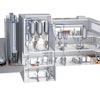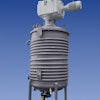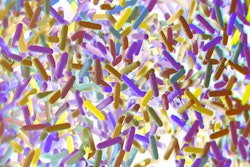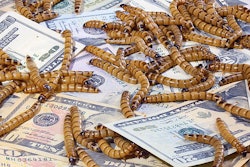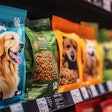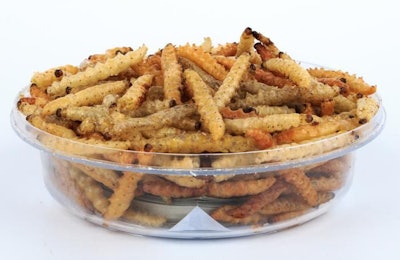
Insect protein and oil producer Ÿnsect acquired Protifarm, a producer of human food ingredients made from mealworms, earlier this month. The acquisition will increase Ÿnsect production volume, while speeding delivery to pet and human food customers, Guillaume Daoulas, business development director for France-based insect protein and oil producer Ÿnsect, wrote in an email.
The pet food market currently accounts for the largest share of demand for insect protein and is likely to remain one of the largest, said Daoulas.
“We forecast the market for insect protein as a pet food ingredient to reach 150,000 metric tons (165,000 US tons) globally by 2030,” Daoulas said.
The company now has two production sites with another under construction. When that facility comes online, Ÿnsect’s total annual production capacity may exceed 254,000 US tons (230,000 metric tons) of insect-based pet food ingredients. Approximately, one-third of this production will be protein meal destined for pet food and aquaculture. Ÿnsect started in Paris, and now has an office and two production sites in France. In the Netherland, the company maintains an office and one production site, with a commercial office in Miami, Florida, USA.
“The company plans to increase production quantities by accelerating the construction of vertical farms,” Daoulas said. “Pet food is already getting exported to the U.S. and Ÿnsect is prospecting in the upper Midwest for land to build a new factory.
Pet food ingredients made from insects
As a pet food ingredient, insect meal can serve as an alternative protein source for dogs and cats with allergies or sensitivities. In these therapeutic or limited ingredient diet formulations, insect protein provide other options. Considering the pet owners, insect-based pet food ingredients may appeal to consumer demands for efficient resource use, such as water conservation and wildlife habitat preservation. Insect farming can use less water, feed, land and fossil fuel use than conventional forms of protein production, such as pastoralism and aquaculture. Likewise, maintaining insect health and comfort tends to be less complicated than for other animals, potentiating marketing claims related to animal welfare. Insect farms may tend to have lower capacity to spread disease to people, a concern after the SARS-CoV-2 coronavirus likely passed from animals into humans. Some insect farms also produce frass, which is essentially insect manure.

